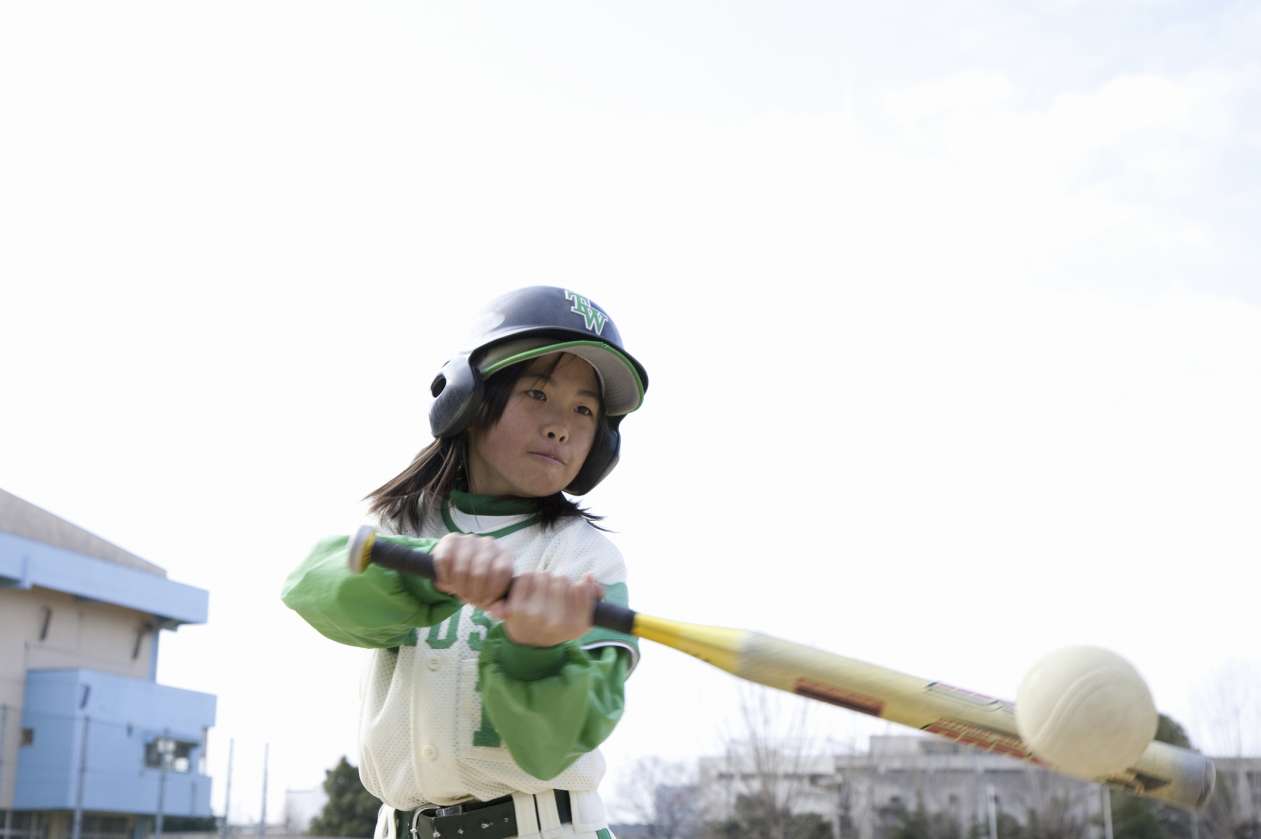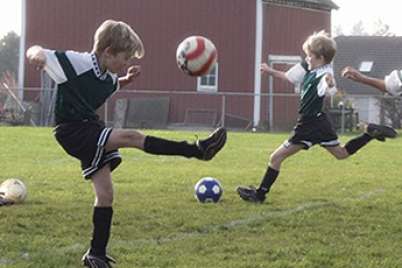
Why kids quit sports
This article was updated on Aug. 30, 2023.
Much as I hate to be the bearer of bad news, I feel I have to share this stat with you: of the 20 million kids in the U.S. that sign up yearly for team sports like hockey, soccer, and baseball, almost 70 percent will quit by the time they’re 13. The number of kids in Canada is different, but it’s reasonable to assume the percentage is similar.
70 percent.
And, what’s worse, they’ll quit permanently. As in they’ll never play that sport again.
Team sports are a great way for kids to be active and with spring just around the corner, you may want to sign yours up for a new season of soccer or baseball. But how can you keep them from saying, “Never again”?
Australia’s news.com offers some insights into why kids may want to quit.
1. They’re not having fun
Team sports offer a unique place for kids to learn about cooperation, winning and losing, and all that other good ‘moral fibre’ stuff. But kids don’t play sports for the fibre. When asked why they play, the number one answer kids give is “to have fun.” For them, having fun during a game is even more important than winning the game. So while their team may be doing well in its inter-city league, if your kids aren’t enjoying themselves, they won’t stick with the sport.
2. They feel awkward, because they lack physical literacy
Nobody likes to feel they’re all elbows and thumbs, especially when they’re around their peers. Kids want to feel reasonably skilled when they play a sport, and if they feel awkward or klutzy, they give up. Confidence and competence come from physical literacy, and your kids develop physical literacy by getting a good grounding in basic movement skills like throwing, running and kicking before they’re asked to dribble a soccer ball in a competitive match or shoot a free throw in basketball game. Sports organizations – Hockey Canada is a great example – are now aware of the importance of physical literacy and have created programs to develop a child’s physical literacy and keep building on it as they grow older in sport.
3. You’re being too “enthusiastic”
You love your kids. You want to be there for them, to root and cheer for them and so you – and all the other parents – come out to watch the games. And this is great. Unless you’re one of those parents who takes the game too personally. Most of us are pretty decent people but often there is that one ‘enthusiast’ who is all aggression and noise. Unfortunately, it only takes one to wreck the game for everyone else, kids included. FYI, kids notice these things and while it’s worse when it’s their parent, kids do not groove on any parent being obnoxious from the sidelines. Fortunately, there are ways you can help to change this behaviour and keep your kids in the game.
4. They’re dreading the post-game car ride home
According to Peter Gahan, head of player and coach development for Australia Baseball, kids know whether or not they played well. Going over the game again or getting into what they could or should have done differently really won’t help them, and it’s more likely to turn them off playing again. The car ride home is an important time for kids to just sit and let the game sink in. If you want to be supportive, ask them to tell you one thing that was fun about the game (especially if they lost) or, better yet, try: “I loved watching you play out there.” The things we say make a difference!






Thanks for sharing..
Great Blog..Thanks for Sharing
It’s one thing to have to put up with daddy/mommy ball in a regular league, where the coaches are volunteering their time to coach (play their child, and other coaches child in field, every inning of every game, batting lead off and clean up, even though they are 0 for 12, and don’t move a muscle when the ball is hit to them). But when your child tried out and made a travel team, had a better batting average than 9 of the 12 girls on the team, played in field extremely successfully for the past 5 seasons, but never got a chance to show that talent because she was busy sitting the bench and shagging the whole teams batting practice before a tournament-that is unacceptable. If you are a volunteer, I appreciate the time you give, even if it is mostly to your child. But when I am paying hundreds of dollars because my daughter was talented enough to make a team, I think mommy/daddy ball should not be allowed. It gives your child a false sense of entitlement, and it gives my child low self esteem and causes her to doubt herself and want to quit. If you are going to bench girls, be fair about it, or bench them according to their skill level, being present at all practices, and being a team player. Winning isn’t everything, but when you don’t win at all, it might be time to switch some of the favorites with some of the bench warmers.
I see another reason why kids quit. When the talented kids are forced to play with the “dirt kickers” or the kids whose parents force them to play, the talented kids start to lose interest because they don’t think it’s fair to them. It’s sad that in this country the emphasis on competition and winning has been replaced by worrying about the ego’s of the kids who don’t care. News Alert: WINNING IS FUN!! Not every kid deserves a trophy or medal. Stop rewarding losing. In the real world if you are bad at something you get replaced by those who are good. If you suck at your job you don’t get paid 6 figures. It’s disgraceful that we’ve become such a soft society where it’s actually becoming a negative to be better than kids at something.
Mike, of course winning is fun. It’s the way you win that makes the difference. If that’s the only thing that drives a coach’s decisions, then some kids are left on the bench, get less play time during games and get sick of the sport. There’s an age when dividing kids according to the level of ability is ok, but not when they are very young and learning the basic of a sport. In hockey in Alberta for example, “AA” begins in pee wee and “AAA” in Bantam. Before that, it’s about developing skills and the love of the game. Beside, coaches in many sport will tell you the story of the players that ruled the league when he was atom (7-8) but is more than average when they are in bantam. Bottom line, before puberty, no one really knows which players will strive later in their career. The price to favour winning at all cost and promoting only the kids who show promise in their early years is just too big to pay. The goal is to get as many kids to be involved in sport for life at the same time that we provide a good base to those who will become the elite.
I have coached youth sports for 16 years, as well as being a parent of kids who played many different sports. I have seen everything you have mentioned above, and appreciate every article that seeks to help parents and coaches understand the effects (positive and negative) their actions have. I have seen too many great kids just drop out of sports, talented athletes…because it just stopped being fun for them. Here is a little post I wrote up about it…it mostly expands on your point #1. Thanks for sharing your thoughts! positiveyouthsportscoach.com/2015/…ng-sports/
Hi Richard! Thank you – and I agree with you that there are many excellent coaches out there that understand their extremely important role in creating positive sports experiences for kids.
Why do kids leave youth sports? So simple – because most coaches at every level – club, travel and even pay-to-play recreation leagues have tied their own egos to winning. Kids are labeled at a very, very young age (I’m talking 5) as “good” or “talented” and cannot change that label regardless of future performance. Instead of doing the real work of coaching and teaching coaches prefer a plug-and-play player who demonstrates high-level skills very early – and then take personal credit for what the kid has likely taught himself. Want to try a new sport? Forget it. How can a kid even remotely attempt a new sport when specialization – and even team rosters – occur by 2nd grade (our area has a player development program for – yes – 4 year olds). Not a plug-and-play good player? You’ll be treated poorly or summarily ignored by all – coaches, other players and their parents. Happen to be a good player? – People will say that you get special treatment, that you are cocky and think you are above coaching, or you are a threat to their kid. Is your Dad the coach – or better yet was he a local high-school star? – you are guaranteed to be the starting pitcher or shortstop – regardless of talent or performance – where a hard-working and super-talented kid whose Dad happens to have to work on game day will be on the bench. Watch the coach secretly gloating when he takes a team of travel-level players and beats a team of casual recreation level players (a “win” against an unchallenging opponent is not a win sir – and is basically “bush league”).
I have followed every single piece of parenting advice regarding raising young athletes – I am silent at games except for some polite clapping – I have driven to and paid for thousands of lessons and camps – I mention nothing but positive things in the infamous “car ride home.”
My son has been the superstar – and the goat. It has taught him more about people and their egos than about the sport itself. Why do kids quit sports? A question I have asked myself is – why would they even want to stay?.
Fight the battles for them – they won’t even know – and arm them with the tools they need to overcome the egos and the dramas and the politics. Those are the tools that they will take into the game of life.
Hi Maria.
I think that many parents will relate to your perspective. I must say that I have witnessed some of the same behaviours as a young athlete (a long time ago…), as a parent of 2 very active kids and as a coach. This being said, my life has been positively influenced by some great coaches who were truly “in it for the right reasons”.
One thing I have noticed over the years is that there’s a big cultural component to how coaches behave. What I mean is that certain clubs or communities seem to breed and support more positive coaches and better experience for kids.
Let’s hope the cultural traits of good coaching ands positive experience spread… and fast.
I couldn’t agree with you more. There is a difference between knowing and understanding that you aren’t one of the best players on the team and that is why you only get to play an inning a game, and knowing that you are one of the best players on the team so you don’t understand why you get treated like this is the first time you’ve ever played softball. Inning after inning and practice after practice of being picked on, singled out, benched, and hearing good job to everyone for mistake after mistake – my once confident, fearless and happy daughter is coming home crying asking if she could quit. I think some coaches should spend their extra time working with their child to make them worthy of the position and batting order they are automatically given, instead of causing talented players to stop believing in themselves, because their coach, the one who is supposed to believe in them, doesn’t.
I’ve played soccer since I was 10, and competitively from age 11 – 17 and my father taught me to be competitive from a young age. It is true, I hated when he was giving me tips on the sideline. However in my case, it actually made me a better player. During the game, he taught me to be aggressive, and that’s one thing that I wish I learned when I first started playing. My first 2 – 3 years of competitive soccer I was a bit of a “kid” when it came to tackles and that was my weakness in defense. When I learned to be aggressive, my entire game changed. I was promoted from the B team to the A team immediately, and later on that year asked to try out for an academy. (did not make it, but it was one heck of an experience)
I guess in many cases those points may be negative things, but when a child’s dream and passion is soccer, they would take all the hate they get, and use it to their advantage to become better than the average player.
Hi Mike – you are highlighting one of the more subtle aspects of coaching and parenting, and that is “every child is a bit different”. As a long time coach and academy instructor, I can add that some kids are VERY different! LOL. But the basic principles are this: Know your child (or your player), and nurture them in sport according to their level of interest, and be sensitive to the magic dividing line between inspiring them to strive harder and frightening them away from playing altogether. Again, every child is a bit different. I have seen 8-year-olds who are ferocious competitors and receptive to every bit of coaching advice I give to them, and I have seen other 8-year-olds who really just want to play with their friends, and they are not altogether interested in my coaching advice (which to them seems entirely esoteric and abstract in relation to their motives for playing, so I respect that as much as possible).
It’s very true. I have had the real pleasure of being able to discuss the aspects of internal vs. external motivation with Olympic rower and now elite trainer of rowers, and his talk on “Carrot or the Stick” reinforces that we need to create an environment and culture of internal motivation, rather than the dominant culture of external motivation, or outcome based. This isn’t to say that results aren’t important, but it’s how we frame the issue, treat our children (athletes), and place the focus.
Children are not miniature adults. They learn, move, and play in fundamentally (and wonderful) way. In fact, we could truly learn from them. We need to follow models like Canadian Sport for Life’s (CS4L) Long Term Athlete Development; whereby, 0-6 years old is the Active Start and focuses on the ABCs (Agility, Balance, Coordination) through unstructured play. Yes, PLAY! For the first six years kids should be playing. And heck, let them create their own play. We as parents/coaches often believe we need to give a structured environment. We really don’t. Kids are amazing, and will find incredible ways to move in all sorts of ways.
From here, the 6-8/9 (slightly different for boys/girls), we move to the FUNdamental Stage. This is when “skills” are first introduced, but once again, in an unstructured, informal setting. That is, create games or activities that produce a given movement, but do not run 7 year olds through circuit training as you may a young adult. As well, kids should be playing 2-3 sports/activities, and not specializing until potentially later in the Train to Compete/Win Stages. A disclaimer, even the CS4L acknowledges that a few sports do require early specialization, such as gymnastics, diving, and I believe the other is figure skating.
Finally, it is paramount children learn the 12 Fundamental Movement Skills, as put forth by Physical & Health Education Canada, and more so before puberty. It has been shown that children that does not learn these, object manipulation, stability, and mobility skills have significant barriers later in adulthood to entering or remaining physically active.
Great article. We need to promote age/developmentally appropriate learning and teaching for our children, and we have many great models to follow and help guide us. We need to create a FUN environment for our children. Let them play, and let them create their own play.